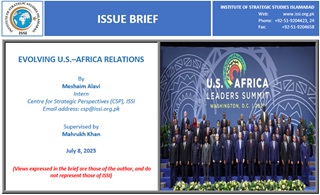The United States’ interest in the African continent has grown significantly during the last decade. Today, its engagement in the region is navigated through four significant and overlapping interests: pragmatic concerns related to security and commercial gains; value-based agenda promoting democracy, human rights, and poverty reduction; and broader geopolitical goals aimed at shaping global alliances and influence.[1]
Historically, Africa has often been viewed as a lesser continent rather than a major driver of U.S. foreign policy.[2] The United States’ policies are largely dominated by different strategic interests and the international and domestic environment. While the U.S Africa policy has in the past appeared inconsistent and incoherent,[3] a rise in recent engagement indicates a greater and renewed understanding of Africa’s strategic significance. As the global strategic and economic competition increases, the U.S seeks to forge stronger alliances in the African continent based on shared interests in development, trade, and security.
Read More
